Week In Review: Big Announcements, Delegations, And More...
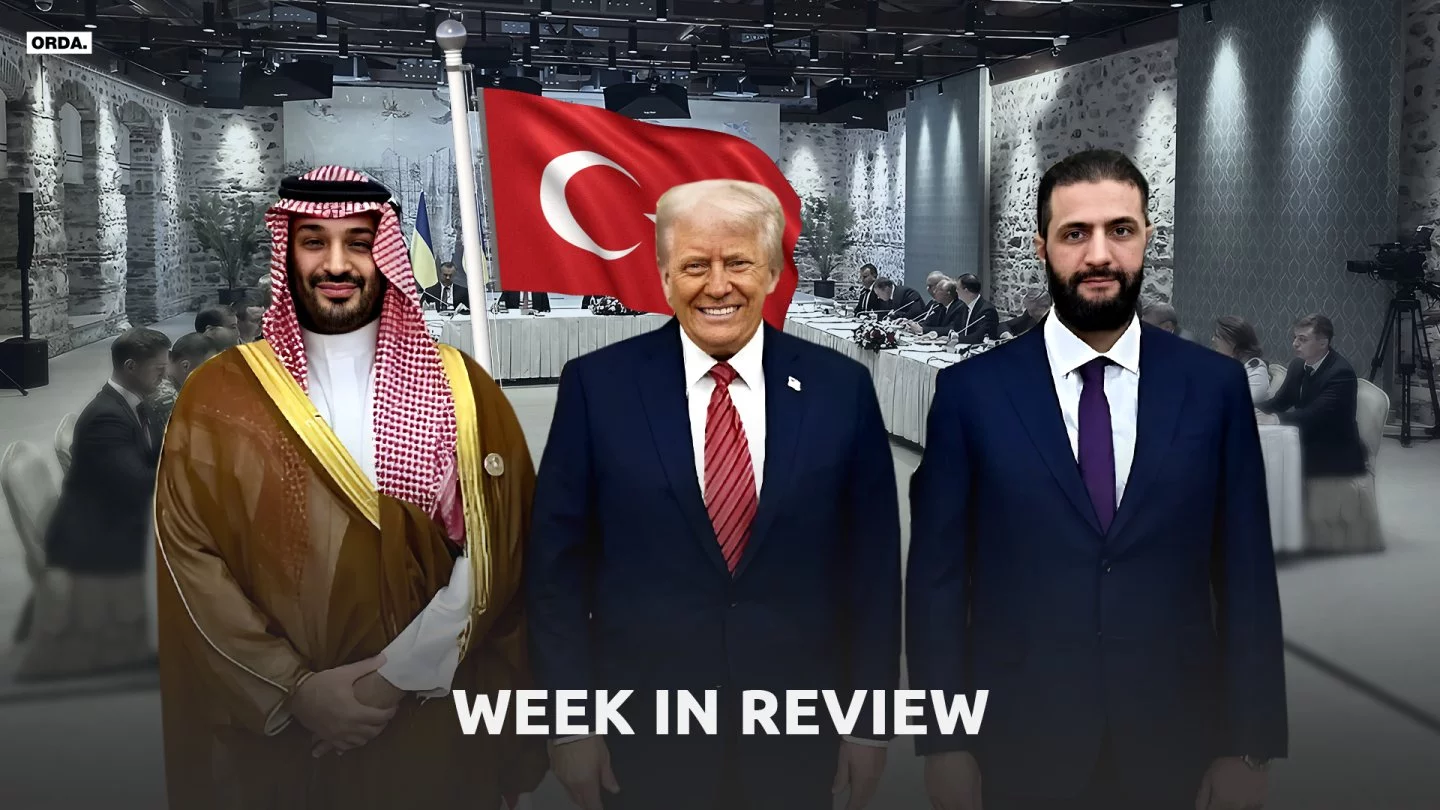 Photo: Orda.kz
Photo: Orda.kz
Orda has put together a brief synopsis of last week's news.
Syria's Comeback?
A rollback of international sanctions on Syria appears to be underway.
In February 2025, the European Union eased restrictions, suspending sanctions in the energy, transport, and banking sectors to support Syria’s political transition. The EU also lifted penalties on the Commercial Bank of Syria, giving member states more leeway to engage with Syrian institutions in reconstruction and counter-terrorism efforts.
The United Kingdom followed on April 24, 2025, removing sanctions on several key Syrian ministries, including the Interior and Defense Ministries.
Then, in a surprise announcement on May 13, 2025, U.S. President Donald Trump declared the complete lifting of all U.S. sanctions on Syria during a speech in Saudi Arabia, while securing a significant investment deal with Saudi Arabia.
The announcement triggered a scramble at the Treasury to understand the policy shift. The move can be seen as a part of the U.S.'s broader efforts to disengage amid announced troop withdrawals, creating space for others to offer Syria economic lifelines.
Saudi Arabia could emerge as a key provider and benefactor, simultaneously delivering a significant blow to its regional rival Iran, which once supported the Assad regime.
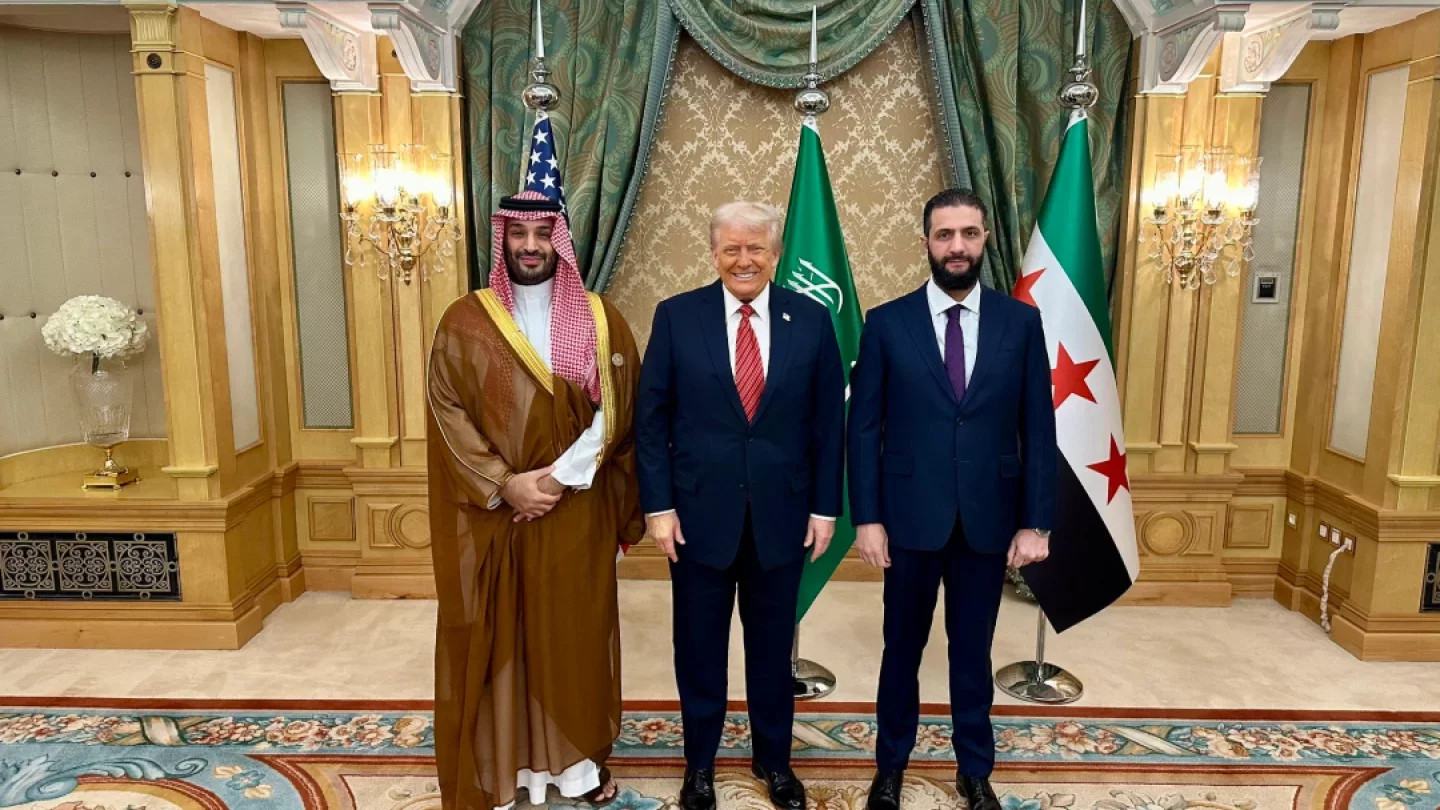
While Trump's announcement was framed as support for Syria’s new leadership and reconstruction, the pace of removal is still uncertain. And, the most stringent sanctions under the 2019 Caesar Syria Civilian Protection Act will require a congressional vote to permanently remove them.
Israeli influence is another non-negligible factor, considering the emphasis on the Abraham Accords during Trump's talks with Sharaa.
At the same time, the World Bank confirmed that Syria’s arrears had been cleared, reinstating eligibility for loans and reconstruction aid on May 16, 2025. The International Monetary Fund (IMF) also announced the appointment of its first mission chief to Syria in over a decade, signaling a resumption of technical and financial support.
Against that backdrop, the EU foreign policy chief, Kaja Kallas, proposed further loosening the bloc's restrictions. France's President claimed he would push for a removal when the matter of extension arises on June 1. These moves appear to mirror the U.S.'s, suggesting the West is leaning towards allowing other nations to interact with Syria worry-free.
Syria urgently needs funding, and the above developments signal fruit being borne, yet skepticism looms. Although Damascus has signalled a push for a more open and inclusive democratic society, the acting President, Ahmed al-Sharaa, maintains a notable grip on key political institutions.
Some experts caution that authoritarian elements in the recently adopted transitional constitution could allow Sharaa and his circle to retain control, as some in society have perceived specific government appointments as symbolic.
Sharaa and his team's associations with hardline Islamic convictions and past methods of governance may amplify such perceptions. Yet, the leadership has seemingly moved away from strict religious interpretations, preferring to prevent radical religious dissent.
The preference extends to legitimization, enabled by renewed international engagement.
Nonetheless, the incidents of violence against minorities, namely the Alawites and Druze, preserve reservations about whether pledges about inclusiveness will be honored. The commission probe into the violence against the Alawites has been extended beyond its initial 30-day deadline, while the situation with the Druze has likely deepened mistrust, which Israel can exploit further. Regarding Israel, Syria has made gestures toward confidence-building with Israel.
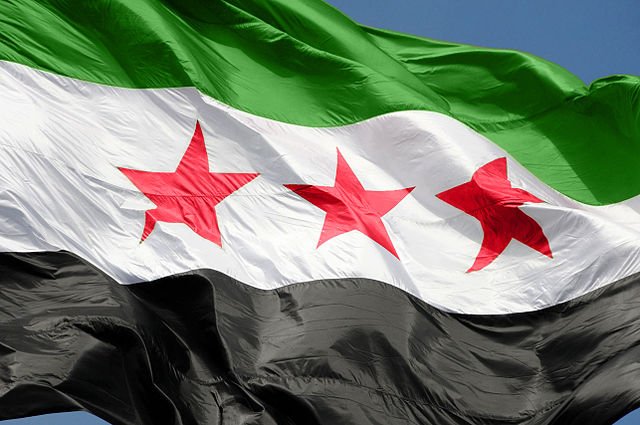
The current leadership will still have to walk a tightrope with religious hardliners under such circumstances.
At the same time, Damascus has made efforts with the Syrian Democratic Forces (SDF), which controls the nation's northeast and predominantly consists of another Syrian minority, the Kurds. Though doubt over its implementation lingers, the parties concluded an agreement that would foster the SDF's integration into Syrian institutions.
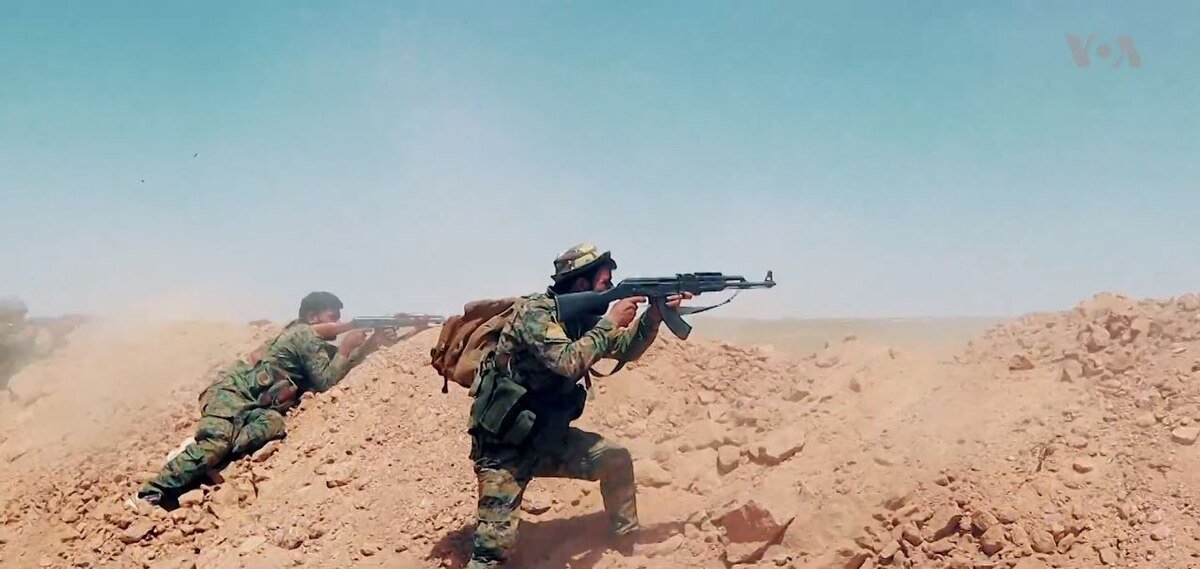
Outside pressure, namely Türkiye, could prove effective in such conditions, but overreaching may very well deepen the divide, considering Ankara's past demonstrations of force against the group.
Despite its dwindling presence, Moscow is another actor Damascus must deal with. Talks over Russia’s naval bases appear to have stalled. And, Syrian authorities will reportedly start printing their currency elsewhere, diminishing reliance on Russia.
Still, the Syrian leadership has alluded to sustaining military cooperation driven by Russian arms used by Syrian forces. Moscow can also provide energy and food, though these provisions, arms included, might face competition further down the road.
Russia's position in the UN Security Council also remains an influential instrument.
However, the Kremlin could encounter pushback from those seeking to engage with Damascus, particularly from nations, e.g., the United Arab Emirates, continuing economic interactions with heavily sanctioned Russia.
West Outmaneuvered?
High-stakes peace talks aimed at ending the Russia–Ukraine war opened in Istanbul this week but yielded no breakthrough, with both Russian President Vladimir Putin and U.S. President Donald Trump absent. Despite early optimism and a flurry of diplomatic activity, the negotiations ended after less than two hours.
Reports surfaced that Trump’s envoys, Steve Witkoff and Keith Kellogg, would attend. Kellogg stated that Trump himself might join, but only if Putin participated. Kremlin spokesperson Dmitry Peskov said Putin would announce his delegation “when he deems it necessary.” Ultimately, both leaders stayed away.
Ukraine had insisted that only Putin had the authority to negotiate peace.
Later, the Kremlin confirmed that Putin’s aide, Vladimir Medinsky, would lead Russia’s delegation, supported by Deputy FM Mikhail Galuzin, top military officials, including Igor Kostyukov and Alexander Fomin, and others. Ukraine’s delegation, led by Defense Minister Rustem Umerov, included senior figures from the SBU and Foreign Ministry.
Despite U.S. Secretary of State Marco Rubio’s presence and a trilateral meeting between the U.S., Türkiye, and Ukraine, the talks hit a wall. Kyiv called Moscow’s demands — including troop withdrawals from Ukrainian regions that Russia claims — “non-starters.”
Umerov confirmed Ukraine’s readiness for a 30-day ceasefire and humanitarian measures like a prisoner exchange and the return of deported children. Russia responded, calling the session a continuation of the 2022 Istanbul process. Reports followed that Russia's delegation purportedly threatened to seize two more Ukrainian regions – Kharkiv and Sumy.
Following the talks, Zelenskyy, along with European leaders, held a joint call with Trump and later met in Albania, urging increased pressure on Moscow. Meanwhile, Medinsky revealed that a 1,000-for-1,000 prisoner exchange is being prepared, and that Ukraine has requested a direct Zelenskyy–Putin meeting, which would be "considered." The Kremlin's spokesperson confirmed that such a meeting is "possible" if the delegations "reach specific agreements."
Despite the breakdown, all parties left the door open for continued dialogue.
Ultimately, Russia, emboldened, seems to be stalling, while Ukraine is again demonstrating to Western nations Moscow's intransigence. Additionally, the reported Russian drone strike hours after the talks in the above-mentioned Sumy region carries more weight than any statement.
The Russian delegation's language and tone hardly distinguish themselves from previous demands voiced, while threats of sanctions have lost their potency. Regarding sanctions, Russia dispatched a fighter jet to protect a shadow fleet vessel facing arrest by Estonian authorities and a Greek-owned vessel that had departed an Estonian port via a pre-agreed route through Russian waters.
Trump has still floated the idea of imposing them again.
However, he seems more focused on the optics of his role in the talks, as evidenced by his announcement of another phone call with Putin and Zelenskyy.
Conversely, Putin, if intentions to end the war are genuine, could be seeking to do so on his own terms.
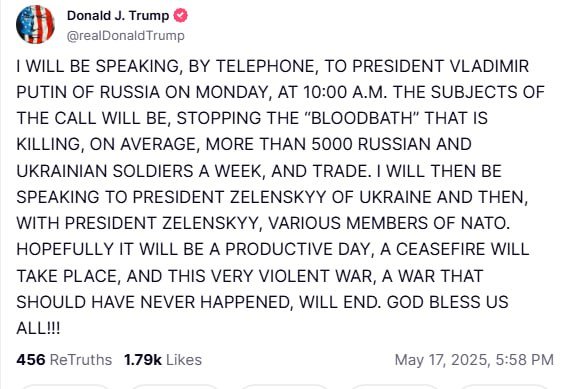
European leaders reportedly discussed how to act after the call, though Russia is unlikely to signal a new direction, while their nations finally agreed on their €150 billion defense fund.
The fund will allow member states to obtain loans to procure weapons and military equipment through joint tenders. Negotiations over its structure and funding mechanisms lasted several months.
The Security Action for Europe (SAFE) initiative will be financed through joint borrowing backed by the EU’s mutual budget. The fund is open to EU member states and select partner countries, including Ukraine, provided their projects strengthen European defense and develop the EU’s military-industrial base.
With previous concerns over Washington's reliability and the reported downsizing of European-stationed American troops, such developments point to the bloc opting for caution over risk.
Latest news
- Kazakhstan Bans Its Airlines From Flying Over Several Middle East Countries
- Astana Strengthens Security Measures Amid Escalation Around Iran
- Tokayev Meets U.S. Ambassador Stufft, Discusses Board of Peace Cooperation
- Mangystau Launches AI-Assisted School Monitoring to Prevent Teen Suicidal Behavior
- Kazakhstan to Supply UK With Critical Minerals
- AI Faculties for Educators to Open in Kazakhstan: What Other Changes Are Coming to the Education Sector
- There Are Medals — But Not Enough Ice: What’s Happening to Figure Skating in Kazakhstan
- Is Kazakhstan’s Nuclear Power Plant Project at Risk After New UK Sanctions? Rosatom Responds
- Prosecutor General’s Office Suspends Extradition of Navalny Ex-Staffer Detained in Almaty
- Former EBRD Executive Jürgen Rigterink Elected as New Independent Director on Bank RBK’s Board of Directors
- Kazakhstan Near Bottom of Retirement Comfort Ranking
- Kazakhstan to Open New International Flights Across Asia, the Middle East and Europe
- Foreign Experts Paid 47 Times More Than Local Scientists in Kazakhstan
- Almaty Utility Services Clear Streets for Fourth Time After Continuous Snowfall
- The Deputy Calls for Checks on Kazakh Officials Named in Epstein Files
- Su-30SM Fighter Jet Crashes Near Karaganda
- School Smartphone Restrictions May Expand Beyond the Classroom
- US warns Ukraine against strikes affecting CPC oil exports
- Kazakhstan and Austria Agree on Readmission of Illegal Migrants
- Digital Rating for Military Commanders Proposed in Kazakhstan

